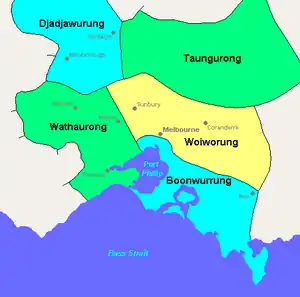Wathawurrung language
Wathawurrung, also rendered as Wathaurong or Wada wurrung, formerly sometimes Barrabool, is the Aboriginal Australian language spoken by the Wathaurong people of the Kulin Nation of Central Victoria. It was spoken by 15 clans south of the Werribee River and the Bellarine Peninsula to Streatham.
| Wathawurrung | |
|---|---|
| Wathaurong | |
| Region | Victoria |
| Ethnicity | Wathaurong people |
| Extinct | (date missing) |
| Language codes | |
| ISO 639-3 | wth |
| Glottolog | wath1238 |
| AIATSIS[1] | S29 |
| ELP | Wathawurrung[2] |
 The five Kulin nations. Wathawurrung ('Wathaurong') is in on the coast in green. | |
Placenames derived from Wathawurrung language terms
| Placename | Origin |
|---|---|
| Barrabool | Unclear, variously reported as "oyster", "slope down to water" or "rounded hill".[3] |
| Barwon | From Barrwang meaning "Magpie", same origin as the town of Parwan. |
| Bungaree | Meaning "hut" or "tent".[4] |
| Buninyong | From Buninyouang, recorded by early colonists as meaning "Man lying on back with raised knee", in reference to the profile of Mount Buninyong. |
| Connewarre | From koonoowarra, meaning black swan.[5] Same origin as the town of Koonwarra in South Gippsland. |
| Corio | Possibly "Sandy cliffs", other sources state "small marsupial" or "wallaby". |
| Geelong | From Djillong, Geelong City Council maintains it means "Land" or "Cliffs",[6] other sources suggest it was the original name of Corio Bay.[7] |
| Gheringhap | Either from "gheran" as meaning "timber", then followed by a placename suffix "-hap",[8] or a reference to the black wattle tree.[9] |
| Gnarwarre | Said to be from the name of a local wetland and its waterfowl, possibly same origin as Lake Connewarre from kunuwarra for the black swan. |
| Jan Juc | Either "milk"[10] or "ironbark". |
| Koorweinguboora | Either "where the crane eats frogs" or "land of many waters".[11] |
| Modewarre | The musk duck.[12] |
| Moolap | A meeting place for gathering shellfish. |
| Moorabool | Either from a word for "ghost" or the name for the curlew. |
| Moriac | Meaning "hill". |
| Parwan | From Barrwang meaning "Magpie", same origin as that of the Barwon River. |
| Wendouree | from wendaaree (the wathawurrong word meaning go away).
When settler William Cross Yuille asked a local indigenous woman what the name of the lake was, she told him to go away. hence the name |
| Werribee | From Wirribi-yaluk, the name of the Werribee River, with Wirribi said to mean "spine" or "backbone".[13] |
| Wingeel | From the word for the wedge-tailed eagle and creator spirit. Compare spelling Bunjil from other Kulin languages |
| Woady Yaloak River | From Wurdi-yaluk meaning "big creek". |
| You Yangs | Reportedly Ude Youang, meaning "big mountains".[14] |
References
- S29 Wathawurrung at the Australian Indigenous Languages Database, Australian Institute of Aboriginal and Torres Strait Islander Studies
- Endangered Languages Project data for Wathawurrung.
- Victorian placenames
- "About the profile areas, Moorabool Shire Council". Retrieved 20 June 2018.
- Threlfall, Gwen (20 December 2016). "The Woodworrongs". The Mount Duneed History Group. Retrieved 7 August 2020.
- "Geelong City". City of Greater Geelong website. Archived from the original on 28 October 2007. Retrieved 2007-12-16.
- Norman Houghton - Norman, Houghton. "The Story of Geelong". Archived from the original on 28 October 2007. Retrieved 2007-12-16.
- Blake, L. J. (1973). Vision and Realisation: A Centenary History of State Education in Victoria (Volume 2). Education Department of Victoria. p. 1008.
- National Library of Australia. "Geelong Advertiser 14 Dec 1918 VICTORIAN TOWN NAMES". Retrieved 20 June 2018.
- "About the profile areas, Moorabool Shire Council". Retrieved 20 June 2018.
- Clark, Ian; Heydon, Toby (2011). "Historical Information: Werribee River". VICNAMES. Government of Victoria. Archived from the original on 7 April 2014. Retrieved 24 April 2018 – via Victorian Aboriginal Corporation for Languages.
This article is issued from Wikipedia. The text is licensed under Creative Commons - Attribution - Sharealike. Additional terms may apply for the media files.